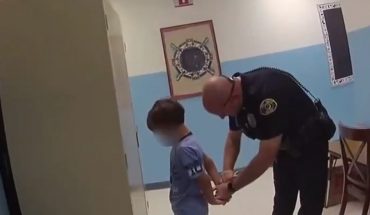It is sung or played at funerals and wakes, small or large, and causes people to cry in almost any context, from the bars to the supermarket aisles. It is inevitable to sing it, and it is often done by trying to contain the cry. “Eternal and unforgettable love,” says the best-known part of the lyrics. For millions of Mexican-Americans, Mexicans and anyone who knows the golden age of pop music in Mexico (the 1980s), the song “Amor Eterno” is the theme that is always heard in farewells. But this week, after the August 3 attack at a Walmart store in El Paso, the song took on a more powerful meaning.
On social media, people who sing “Eternal Love” have appeared in wake-ups and impromptu commemorations. On Sunday, August 4, a day after the shooting, a mariachi known as Sunset played the song at an interfaith wake held at Ponder Park in El Paso. At the site of the shooting that same afternoon, a Univision journalist captured the moment when a young woman began singing the lyrics already known, shaking and not addressing anyone in particular, before wiping away tears.” People were just crying, holding hands, because the song is very popular,” said Angelica Casas, a BBC camerawoman, who filmed the mariachis in the wake. His video, posted on Twitter, was viewed more than 330,000 times in two days.
If you come from a Mexican family, you know this song. It’s usually sung at funerals as a last good bye. It ends with the promise that one day we will reunite. Today, #ElPaso sang it to the 20 victims of Saturday’s massacre. #AmorEterno pic.twitter.com/EUACgnqIsl — Angelica Maria Casas (@AngelicaMCasas)
August 5, 2019
Written by Juan Gabriel, the music superstar who grew up in the border City Juárez, “Amor eterno” is a mariachi ballad accompanied by guitars that was unveiled by the longtime muse of Juan Gabriel, the Spanish singer Rocío Durcal. The lyrics say, “As I would as I would as I would as i would have lived, that your little eyes would never have closed and be looking at them. eternal and unforgettable love.” Mexican culture is full of music played in times of pain, a characteristic of national identity that has been transmitted to Mexican-Americans born in the United States even if they have already assimilated English or spoken fluently, he said Ernesto Chávez, professor of history at the University of Texas at El Paso.” My parents are from Juarez and, although I am not a big fan of Juan Gabriel, they always invoke him,” said Chavez, who was born in Los Angeles. “The only time I hear ‘Eternal Love’ is at funerals.” They played it at my aunt’s funeral,” she said. “My sister-in-law got up and started singing it with the mariachis.”
Relatives of the victims next to the memorial. Photo: AFP
A nine-story mural by Juan Gabriel greets visitors to El Paso a few blocks after crossing south to Juarez from the Paso del Norte bridge, Chávez noted. Juan Gabriel was born in 1950 in southern Mexico and raised in Juarez, where he is considered the son of the city. He died in August 2016 in Santa Monica, California, at the age of 66. For el Paso citizens and Americans of Mexican descent in general, the sense of loss this week intensified when it was revealed that El Paso’s victims were targeted because of their ethnic and national backgrounds. Eight of El Paso’s twenty-two victims have been confirmed as Mexican citizens. Their lives were interrupted when they visited the United States to make their purchases back to school. The El Paso tragedy was one of two mass shootings in the United States that occurred a few hours apart in Texas and Dayton, Ohio, and killed 31 people in total. Days earlier, on July 28, a shooter killed three and injured thirteen others in Gilroy, California, at a garlic festival. “Eternal Love” was sung in a wake in San Jose, California, held in memory of 13-year-old Keyla Salazar, who was murdered in Gilroy, according to a report in The Salinas Californian.
“El Paso is a Family and WE stand”. Photo: AP
The Attacks in El Paso and Gilroy are investigated as acts of domestic terrorism. According to federal officials, in all three shooting cases, the attackers expressed, or were said to be exploring, violent ideologies. As the identity of more victims is revealed, and El Paso and Juarez prepare to fire their loved ones at funerals, “Eternal Love” is likely to be heard more in the coming days, Chavez said. People are just trying to find a way to express their mourning, and I think the song has become that, basically,” he said.
Original source in Spanish





